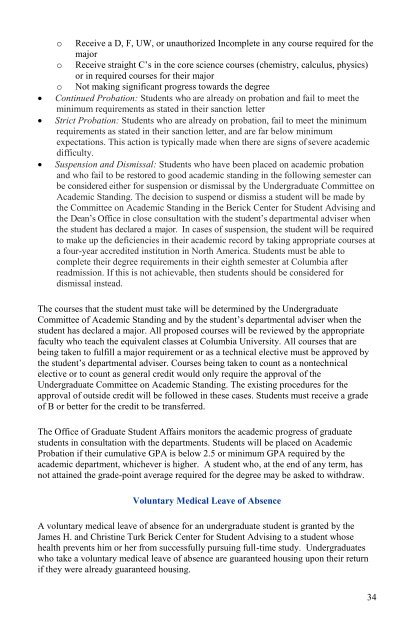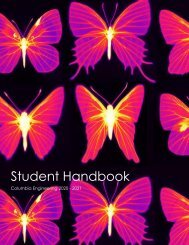SEAS Student Handbook
Create successful ePaper yourself
Turn your PDF publications into a flip-book with our unique Google optimized e-Paper software.
o Receive a D, F, UW, or unauthorized Incomplete in any course required for the<br />
major<br />
o Receive straight C’s in the core science courses (chemistry, calculus, physics)<br />
or in required courses for their major<br />
o Not making significant progress towards the degree<br />
Continued Probation: <strong>Student</strong>s who are already on probation and fail to meet the<br />
minimum requirements as stated in their sanction letter<br />
Strict Probation: <strong>Student</strong>s who are already on probation, fail to meet the minimum<br />
requirements as stated in their sanction letter, and are far below minimum<br />
expectations. This action is typically made when there are signs of severe academic<br />
difficulty.<br />
Suspension and Dismissal: <strong>Student</strong>s who have been placed on academic probation<br />
and who fail to be restored to good academic standing in the following semester can<br />
be considered either for suspension or dismissal by the Undergraduate Committee on<br />
Academic Standing. The decision to suspend or dismiss a student will be made by<br />
the Committee on Academic Standing in the Berick Center for <strong>Student</strong> Advising and<br />
the Dean’s Office in close consultation with the student’s departmental adviser when<br />
the student has declared a major. In cases of suspension, the student will be required<br />
to make up the deficiencies in their academic record by taking appropriate courses at<br />
a four-year accredited institution in North America. <strong>Student</strong>s must be able to<br />
complete their degree requirements in their eighth semester at Columbia after<br />
readmission. If this is not achievable, then students should be considered for<br />
dismissal instead.<br />
The courses that the student must take will be determined by the Undergraduate<br />
Committee of Academic Standing and by the student’s departmental adviser when the<br />
student has declared a major. All proposed courses will be reviewed by the appropriate<br />
faculty who teach the equivalent classes at Columbia University. All courses that are<br />
being taken to fulfill a major requirement or as a technical elective must be approved by<br />
the student’s departmental adviser. Courses being taken to count as a nontechnical<br />
elective or to count as general credit would only require the approval of the<br />
Undergraduate Committee on Academic Standing. The existing procedures for the<br />
approval of outside credit will be followed in these cases. <strong>Student</strong>s must receive a grade<br />
of B or better for the credit to be transferred.<br />
The Office of Graduate <strong>Student</strong> Affairs monitors the academic progress of graduate<br />
students in consultation with the departments. <strong>Student</strong>s will be placed on Academic<br />
Probation if their cumulative GPA is below 2.5 or minimum GPA required by the<br />
academic department, whichever is higher. A student who, at the end of any term, has<br />
not attained the grade-point average required for the degree may be asked to withdraw.<br />
Voluntary Medical Leave of Absence<br />
A voluntary medical leave of absence for an undergraduate student is granted by the<br />
James H. and Christine Turk Berick Center for <strong>Student</strong> Advising to a student whose<br />
health prevents him or her from successfully pursuing full-time study. Undergraduates<br />
who take a voluntary medical leave of absence are guaranteed housing upon their return<br />
if they were already guaranteed housing.<br />
34








